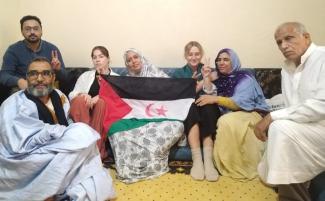
Aaiun (Occupied Territories) 02 November 2024 (SPS) – The Moroccan authorities of occupation in occupied Aaiun, forcibly deported two Norwegian citizens early Saturday morning, highlighting tensions surrounding Morocco’s controversial renewable energy initiatives in the occupied territory of Western Sahara.
A total of 25 plainclothes Moroccan police officers detained the Norwegian activists, Ingeborg Sævik Heltne and Vivian Kaulen Nedenes, while they were visiting the home of Sahrawi human rights activist Sidi Mohamed Daddach.
The two women had traveled to the region to investigate about Sahrawi citizens' perspectives on Morocco’s renewable energy projects, which are being developed on Western Sahara lands that the United Nations considers as Africa's last colony. Shortly after the women arrived at Daddach's home, police arrived and immediately ordered their deportation.
Activist Heltne stated, "we were given ten minutes to get to our hotel to pack our things. Then we were ordered to leave Western Sahara. Now we’re in an escort heading to Agadir”. She noted that Moroccan authorities had been monitoring them since their arrival a day and a half earlier.
Heltne works with the Norwegian Council for Africa and has previously conducted academic research on how Morocco uses renewable energy to reinforce its occupation of Western Sahara. Nedenes, a student and member of the Norwegian Socialist Party’s Youth, was also interested in the impact of these projects on the Sahrawi people.
During their detention, the police confiscated the passports of the two young women and searched their phones, objecting on photos they had taken in public spaces, allegedly "without prior permission from Rabat," according to police claims.
The activists expressed concern over the incident, citing it as a serious violation of freedom of movement and expression in the occupied territories of Western Sahara and an additional restriction on international observers who are denied access the territory.
The Moroccan authorities of occupation faces criticism for its development projects in Western Sahara, especially due to signing agreements with foreign countries and companies without consulting the Sahrawi people and their legitimate representative, the Polisario Front.
Morocco is actively pushing to involve companies and countries in renewable energy and other economic projects, including recent agreements with France to finance a major power cable linking the occupied territories to Morocco's electricity grid.
Heltne emphasized the urgent need for international human rights monitoring, stating that “as long as the Sahrawis cannot express themselves about Morocco's climate projects, serious alarm bells should ring for states and companies. Not only is it wrong to support occupation, but agreements with Morocco are also on shaky legal ground if the Sahrawis' right to self-determination is not respected. And Morocco has absolutely no interest in addressing that right."
This incident comes in light of a European Court of Justice ruling that considered that EU trade agreements with Morocco cannot be applied in Western Sahara without the consent of the Sahrawi people and their legitimate representative, the Polisario Front. (SPS)
090/500/60 (SPS)